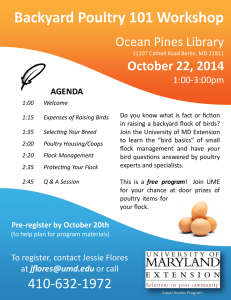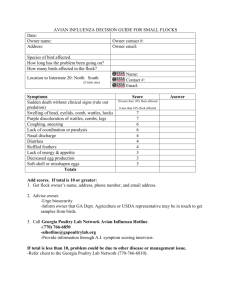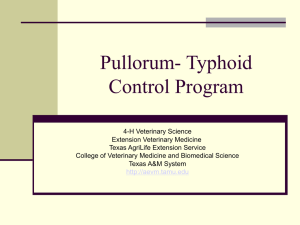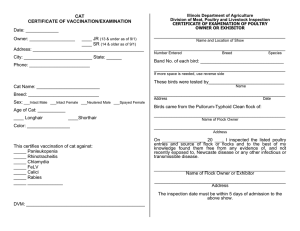Iowa`s NPIP Requirements - Iowa Poultry Association
advertisement
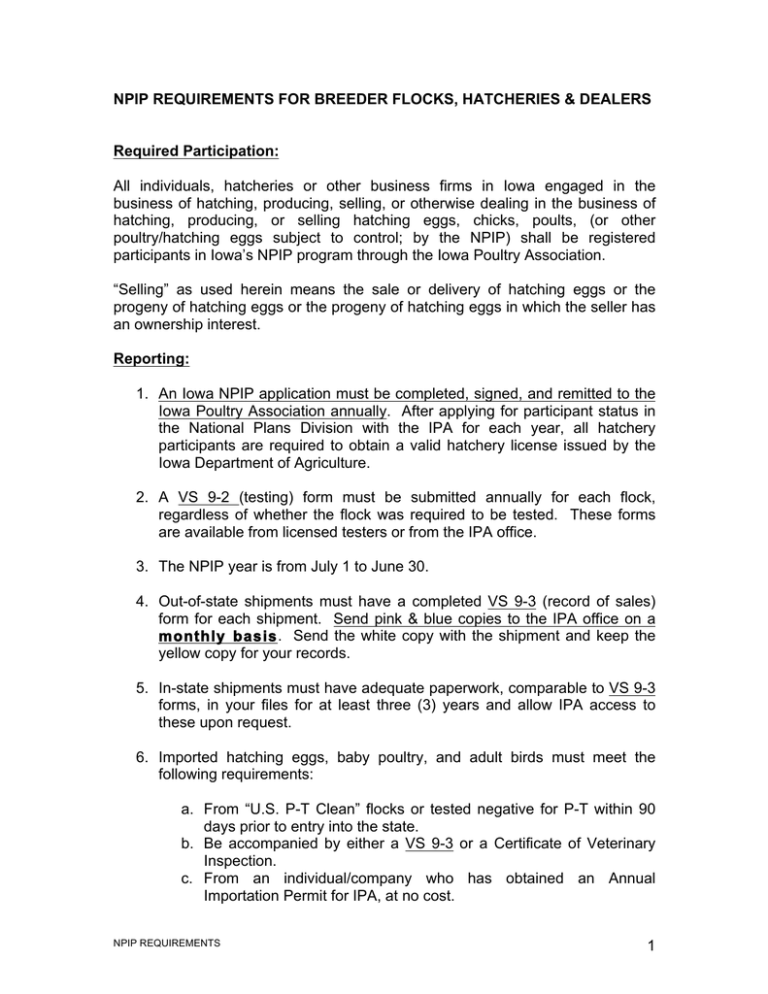
NPIP REQUIREMENTS FOR BREEDER FLOCKS, HATCHERIES & DEALERS Required Participation: All individuals, hatcheries or other business firms in Iowa engaged in the business of hatching, producing, selling, or otherwise dealing in the business of hatching, producing, or selling hatching eggs, chicks, poults, (or other poultry/hatching eggs subject to control; by the NPIP) shall be registered participants in Iowa’s NPIP program through the Iowa Poultry Association. “Selling” as used herein means the sale or delivery of hatching eggs or the progeny of hatching eggs or the progeny of hatching eggs in which the seller has an ownership interest. Reporting: 1. An Iowa NPIP application must be Iowa Poultry Association annually. the National Plans Division with participants are required to obtain Iowa Department of Agriculture. completed, signed, and remitted to the After applying for participant status in the IPA for each year, all hatchery a valid hatchery license issued by the 2. A VS 9-2 (testing) form must be submitted annually for each flock, regardless of whether the flock was required to be tested. These forms are available from licensed testers or from the IPA office. 3. The NPIP year is from July 1 to June 30. 4. Out-of-state shipments must have a completed VS 9-3 (record of sales) form for each shipment. Send pink & blue copies to the IPA office on a monthly basis. Send the white copy with the shipment and keep the yellow copy for your records. 5. In-state shipments must have adequate paperwork, comparable to VS 9-3 forms, in your files for at least three (3) years and allow IPA access to these upon request. 6. Imported hatching eggs, baby poultry, and adult birds must meet the following requirements: a. From “U.S. P-T Clean” flocks or tested negative for P-T within 90 days prior to entry into the state. b. Be accompanied by either a VS 9-3 or a Certificate of Veterinary Inspection. c. From an individual/company who has obtained an Annual Importation Permit for IPA, at no cost. NPIP REQUIREMENTS 1 7. Records of purchases and sales, products, and materials used to advertise products must be kept and made available to IPA for inspection upon request. 8. Only participants may use the official NPIP emblems, and advertising must be in accordance with the “Plan”. 9. Each participant shall be assigned a permanent NPIP approval number. This number should be used on each certificate, invoice, and/or shipping label in the sale of participant’s products. Participation Fees: 1. Annual breeder fees for all types of breeder flocks are .05 cents per breeder female, with a $20.00 minimum fee per flock. Breeder fees should be remitted with submission of the VS 9-2’s. If fees are not paid, you will be billed based on your 9-2’s. 2. If a hatchery also has Breeder flocks in Iowa, the NPIP dues are the same as the above breeder fees; .05 cents per breeder hen. 3. If a Hatchery does not have breeders, the annual fee is $25.00. 4. The annual Dealer fee is $20.00 per store location. 5. Renewals of Pullorum-Typhoid tester’s permits are $15.00 per calendar year or $70 for five years, due in June each year. 6. To obtain a P-T permit, you must attend and complete a certification class once every five (5) years. Information can be obtained from the IPA office regarding this certification class by calling (515) 727-4701 ext. 14. Definitions: 1. Primary Breeders: Composed of one (1) or more generations, these flocks are maintained to establish, maintain or improve parent lines. 2. Multiplier Breeders: Are most often used to produce hatching eggs for commercial markets, these flocks are not kept beyond their production cycle. New flocks are purchased annually from a clean primary breeding flock, following thorough cleaning and disinfecting of the facility. All breeders must be obtained directly from “U.S.P-T Clean” primary flocks. 3. Hobby Breeders: Iowa allows a testing program other than that for “primary breeders” for smaller, backyard flocks bred and kept for several years. These birds are often fancy poultry raised for enjoyment. NPIP REQUIREMENTS 2 Inspection: The Iowa Department of Agriculture will inspect each hatchery at least annually. Records of flocks maintained primarily for production of hatching eggs will be examined regularly. Required Disease Classifications: 1. All poultry breeders are to be “U.S. Pullorum-Typhoid Clean” as Iowa is a certified “U.S. P-T Clean State”. 2. All commercial egg-type chicken breeders, of more than 1,000 chickens to a producer, are to be “U.S. Salmonella Enteritidis Monitored” for poultry that is crossing the state line. 3. All turkey breeders are to be “U.S. M. Gallisepticum Clean” since Iowa is a certified “U.S. M. Gallisepticum Clean State”. 4. All waterfowl and game bird flock owners: a. General Guidelines: i. Flock owner participation is voluntary. Hatcheries must participate. ii. Testing by a private, authorized tester is at the flock owner’s expense. iii. All flock owners who meet the requirements will be sent a certificate of participation. Flock Testing Requirements: 1. Poultry must be more than 16 weeks of age but less than 24 weeks when blood tested for an official classification. With exception to: Turkey candidates (12 weeks) and Game Birds (4 months or sexual maturity). 2. The rapid, whole blood plate test is an accepted blood test for all poultry except turkeys, which require that a tube test be done in an approved laboratory. For a list of approved testers and/or laboratories, call the IPA office at (515) 727-4701. 3. Primary Breeders: You must test 300 birds, or entire flock if less than 300 birds, and submit all results to IPA. 4. Multiplier Breeders: All must be purchased from “U.S. P-T Clean” flocks, thus no additional testing must be done to meet the P-T requirement. Egg-type chickens and turkeys have additional requirements. NPIP REQUIREMENTS 3 5. Hobby Breeders: Must be “closed” flocks with no poultry entering or reentering the flock. If any poultry are added to the flock, they must be isolated from current flocks for 30 days and then tested for Pullorum after the 30-day isolation. “Closed” flock hobby breeders are required to test on the following schedule: 1st year: 100% of flock tested negative and reported to IPA. 2nd year: 75% of flock tested negative and reported to IPA, with a minimum of 100 birds tested. 3rd year: 50% of flock tested negative and reported to IPA, with a minimum of 100 birds tested. 4th year: 25% of flock tested negative and reported to IPA, with a minimum of 100 birds tested. Monitoring Program: Same as the 4th year. 6. If your birds are being exposed to other poultry, such as at poultry shows, you should be blood testing 100% of your flocks each year. 7. Domesticated Waterfowl and Game Bird specific requirements: a. Initial test: 100% of breeding flock. b. Monitoring program for game birds and waterfowl: i. Hatching options: 1. Annually test up to 10% of the breeding flock, with a maximum of 150 birds, provided that if the flock is under 100 birds all are tested; or 2. Collect from the first yearly hatch, up to 30 dead-inshell eggs and or dead birds collected during the first 14 days of life. This may be done for two (2) years after the initial flock certification test. Based on the test results, the participant will be issued a yearly certificate of participation. On the third year, a 10% test of the breeding flock will be required, provided that if the flock is less than 100 birds, all are tested. ii. Independent flock owners who sell hatching eggs or maintain a flock for exhibition sales, and dealers who maintain at least one (1) breeding flock will be required to test 10% of their breeding adult flock yearly to continue participation. c. Game bird option of cloacal swabs: i. Primary breeders of game birds in Iowa may use the cloacal swab-monitoring program, after the initial 100% blood test. Swabs must be performed in accordance with section Subpart B(3)(2) of the NPIP program standards. ii. Following the initial 100% blood test, 1. The first year, 100% of the flock is swabbed. 2. The second year, 75% of the flock shall be swabbed. 3. The third year 50% of the flock shall be swabbed. NPIP REQUIREMENTS 4 4. 100 birds are the minimum for testing. If a flock is under 100 birds, 100% of the flock shall be swabbed. iii. If the breeder flock is less than 100 birds, the flock owner has the option of 100% blood testing or 100% cloacal monitoring. Hatchery, Breeder and Dealer Operation Requirements: 1. Hatcheries, breeders, and brooder rooms should be kept in sanitary conditions. Hatcheries and hatching trays should be cleaned and fumigated or disinfected after each hatch. 2. All products hatched must be from flocks with every classification the hatchery claims. Hatching eggs may come from flocks with additional classifications, but the baby poultry will lose this classification after hatch. 3. If hatching eggs are from flocks outside of Iowa, the hatchery must either keep copies of required testing results, or have an agreement with the breeder to have immediate access to these reports upon the request of IPA. 4. If a hatchery keeps started poultry, these must be effectively separated from the incubator room. 5. If a person is responsibly connected with more than one hatchery, all such hatcheries must participate in the Plan if any one of them participates. 6. Dealers in poultry breeding stock, hatching eggs, or baby/started poultry must comply with all provisions, which apply to their operations. Refer to the NPIP and Auxiliary Provisions book. (March 2000 APHIS 91-55-054) 7. Participants may not buy, sell, or receive for any purpose, products from non-participants without specific permission from IPA. 8. All equipment, buildings, and land in immediate vicinity should be kept in sanitary condition. Poultry/hatching eggs transportation should be performed only in cleaned and disinfected equipment and vehicles. Noncompliance: Participants who, after investigation by IPA and either the Iowa Department of Agriculture and Land Stewardship (IDALS) or Iowa Department of Natural Resources (IDNR) are notified of noncompliance with the Plan, shall be afforded a reasonable time to reach compliance. If compliance is not met, the participant may be disbarred from further participation in the Plan for a period, as NPIP may deem appropriate. NPIP REQUIREMENTS 5 U.S. P-T Clean State requirements: 1. All participants are required to observe and abide by all rules and regulations pertinent to the continuance of the “U.S. Pullorum-Typhoid (P-T) Clean State” status, including, a. All Hatcheries are qualified as “National Plans Hatcheries”. b. All hatchery supply flocks are qualified as “U.S. P-T Clean Flocks”, provided that if other domesticated fowl (except waterfowl) are maintained on the same premises as the supply flock, then a blood test for P-T is required from each of these fowl. c. All poultry brought into Iowa must be certified as “U.S. P-T Clean”. d. All poultry disease diagnostic personnel and authorized P-T testers are required to report any Pullorum or fowl Typhoid isolated within 48 hours of the occurrence. e. All reports of Pullorum or fowl Typhoid are promptly followed by an investigation by IPA and the Iowa Department of Agriculture. f. All flocks found infected with Pullorum or Typhoid are quarantined until marketed or destroyed; and g. All poultry going to public exhibition shall come from “U.S. P-T Clean” flocks or have had a negative P-T test within 90 days of going to public exhibition. Other State’s requirements: Call each state’s NPIP Official State Agency (OSA) for importation regulations at this site: http://www.poultryimprovement.org/documents/OfficialS tateAgencies04-30-2015.pdf OR Check with each state’s veterinarian for specific poultry importation regulations at the follow site: http://www.usaha.org/Portals/6/StateAnimalHealthOfficia ls.pdf Iowa Poultry Association 8515 Douglas Avenue, Suite 9 Urbandale, IA 50322-2924 PH: 515-727-4701FAX: 515-727-4707 www.iowapoultry.com NPIP REQUIREMENTS 6

